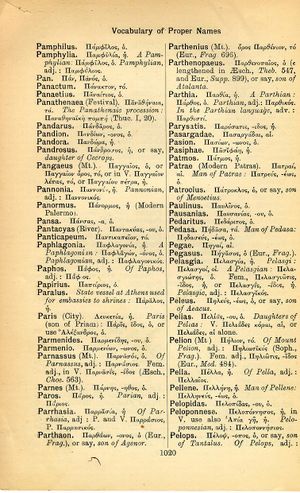Parthenopaeus: Difference between revisions
From LSJ
Φίλος με βλάπτων (λυπῶν) οὐδὲν ἐχθροῦ διαφέρει → Laedens amicus distat inimico nihil → Ein Freund, der schadet, ist ganz gelich mir einem Feind
(6_11) |
m (Text replacement - "]]>" to "]]") |
||
| Line 3: | Line 3: | ||
}} | }} | ||
{{Lewis | {{Lewis | ||
|lshtext=<b>Parthĕnŏpaeus</b>: i, m., = [[Παρθενοπαῖος]] | |lshtext=<b>Parthĕnŏpaeus</b>: i, m., = [[Παρθενοπαῖος]],<br /><b>I</b> the [[son]] of [[Meleager]] and Atalante, one of the [[seven]] [[who]] went [[against]] [[Thebes]]: [[inclutus]] armis [[Parthenopaeus]], Verg. A. 6, 480; Stat. Th. 4, 248; cf. Hyg. Fab. 99. | ||
}} | }} | ||
Revision as of 09:30, 13 August 2017
English > Greek (Woodhouse)
Παρθενοπαῖος, ὁ (ε lengthened in Aesch., Theb. 547, and Eur., Supp. 899), or say, son of Atalanta.
Latin > English (Lewis & Short)
Parthĕnŏpaeus: i, m., = Παρθενοπαῖος,
I the son of Meleager and Atalante, one of the seven who went against Thebes: inclutus armis Parthenopaeus, Verg. A. 6, 480; Stat. Th. 4, 248; cf. Hyg. Fab. 99.

